Men's Health Screening Singapore
Last updated: Jul 19, 2025
What Is Men’s Health Screening?
Men’s health screening consists of medical tests that detect early signs of conditions
commonly affecting men, such as heart disease, diabetes, high cholesterol, prostate
disorders, and certain cancers.
These screenings help assess your current health, identify risk factors, and guide recommendations
for lifestyle changes or further checks if needed. Just as importantly, they give you peace of mind
by helping you take active steps to look after your health while enjoying life.
At ATA Medical, we offer personalised men’s health screening packages from $76 NETT,
and subsidised Screen for Life screenings for eligible Singaporean Citizens.
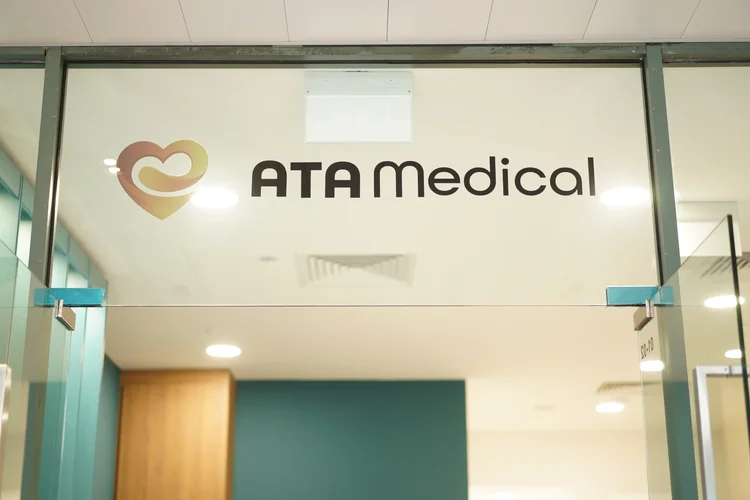

Convenient, discreet, and reliable. Book your home screening today.
Why Is Regular Health Screening Important for Men?
Regular health screenings are important because they can:
- Detect silent conditions like high blood pressure or high cholesterol early.
- Monitor ongoing health risks and medical conditions as you age.
- Guide lifestyle changes or adjustments to your treatment plan.
Timely intervention also helps reduce the risk of disease onset, progression, or complications.
Recommended Health Screenings for Men in Singapore
In Singapore, recommended health screenings for men include tests for chronic conditions and
colorectal cancer, as outlined under the Screen
for Life (SFL) programme. SFL is a national screening initiative developed by the Health Promotion Board (HPB) to encourage early
detection and preventive care.
For men, the following screenings are commonly recommended:
| Age Group | Condition(s) Screened | Screening Test(s) | Frequency |
|---|---|---|---|
| 40 years and above | Chronic conditions such as obesity, diabetes, high cholesterol, and hypertension | HbA1c or fasting blood glucose, cholesterol tests, height and weight, BMI, blood pressure | Every 3 years |
| 50 years and above | Colorectal cancer | Stool Occult Blood Test (Faecal Immunochemical Test) | Every year |
Common Tests Included in Men’s Health Screening Packages
Health screening packages typically go beyond basic recommendations to provide a more
comprehensive view of your overall health.
They include a mix of blood tests, physical assessments, and diagnostic imaging, with selected tests
tailored to address health concerns commonly associated with men.
| Test | What It Checks / Purpose |
|---|---|
| Biometric Measurements | |
| Blood Pressure & BMI | Assesses cardiovascular risk and weight-related health status. |
| Blood Analysis | |
| Full Blood Count | Evaluates red and white blood cells for signs of infection, anaemia, or other issues. |
| Fasting Blood Glucose | Screens for diabetes and blood sugar abnormalities. |
| Lipid Profile | Measures cholesterol and triglyceride levels to assess heart disease risk. |
| Liver & Kidney Function Tests | Check how well your liver and kidneys are functioning. |
| Thyroid Function Test | Detects overactive or underactive thyroid conditions. |
| Urinalysis | |
| Urine FEME | Detects urinary tract issues and possible systemic health problems. |
| Urine Microalbumin / Creatinine Ratio | Screens for early signs of kidney damage, especially in those with diabetes or hypertension. |
| Stool Analysis | |
| Faecal Immunochemical Test (Fit) | Screens for hidden blood in stool, a marker for colorectal cancer. |
| Cancer Screening | |
| Tumor Marker Tests | Screens for cancer-related proteins in the bloodstream such as prostate-specific antigen (PSA) and carcinoembryonic antigen (CEA), depending on individual risk factors. |
| Imaging Scans | |
| Ultrasound | Provides visual assessment of organs such as the prostate, liver, and kidneys. |
| Chest X-ray | Screens for lung abnormalities, especially in long-term smokers. |
| Electrocardiogram (ECG) | Measures heart rhythm and identifies potential abnormalities. |
| Infection Screening | |
| Sexually Transmitted Infections (STIs) | Screens for sexually transmitted infections like HIV, chlamydia, gonorrhoea, syphilis, genital herpes, hepatitis, and others. |
| Specialised Tests | |
| Testosterone Levels | Assesses hormonal balance that may affect mood, libido, or energy levels (requires a morning sample). |
| Vitamin Deficiency Screening | Detects deficiencies in vitamins such as B12, D, and folate. |
| Colonoscopy | Examines the colon for cancer, polyps, or inflammation; often recommended for men over 50. |
| Gut Microbiome Test | Analyses gut bacteria composition to assess digestive health and inflammation risk. |
| Treadmill Stress Test | Assesses heart function during physical activity (if clinically indicated). |
| Bone Density Test (DEXA Scan) | Assesses bone strength and risk of osteoporosis, particularly in older adults. |
| CT Scan / MRI | Provides detailed imaging for internal organs or suspected abnormalities. |
When Should Men Go for Health Screening?
The timing and frequency of health screenings depend on your age, lifestyle, and medical history, with increasing scope and frequency as you grow older.
- Younger Men (< 40) – Focus on general health markers such as blood pressure, BMI, cholesterol, and blood glucose. Consider screening every 1 to 3 years to support early detection and preventive care.
- Middle-Aged Men (40 – 49) – Include further screenings for cardiovascular risk, prostate health, and metabolic conditions such as fatty liver disease.
- Older Men (> 50) – Add tests for age-related conditions, including colorectal cancer and more detailed heart and prostate assessments.
Disclaimer: This is a general recommendation and should not be taken as medical advice. If you are unsure, or have existing health conditions or a family history of illness, consult a doctor to determine the most appropriate screening tests and frequency for your needs.
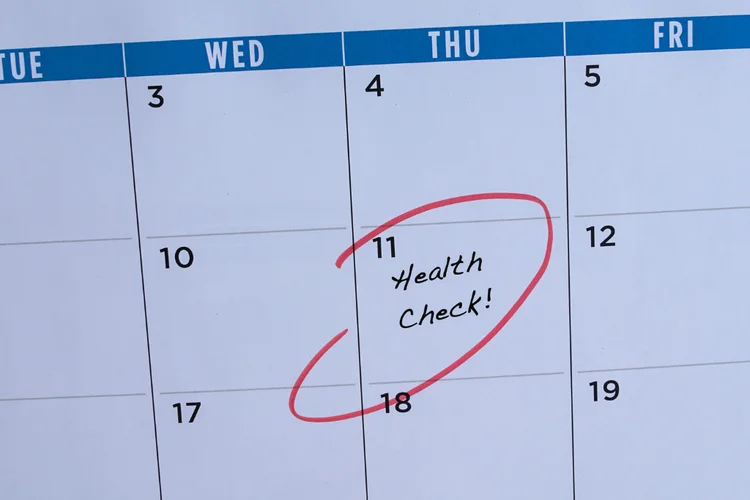
Men’s Health Screening Packages at ATA Medical
At ATA Medical, we offer comprehensive health screening packages, with the prices as follows:
| Package | Price* |
|---|---|
| In-clinic Packages | |
| Ace | $76 |
| Elite | $130 |
| Noble | $226 |
| Pre-Marital (Male) | $291 |
| Pre-Marital (Female) | $325 |
| Silver | $368 |
| Crown | $381 |
| Crown Plus | $485 |
| Royal | $667 |
| Jewel | $1415 |
| Marvel | $2289 |
| Prestige | $5250 |
| Imperial | $5850 |
| Supreme | $7050 |
| Home Health Screening Packages | |
| Bronze | $117 |
| Gold | $172 |
| Platinum | $270 |
| Diamond | $412 |
| Sapphire | $654 |
| For custom requests | Please enquire |
^Prices last updated on Jan 28, 2026. While every effort is made to keep pricing information up to date, please contact our team to confirm the latest rates.
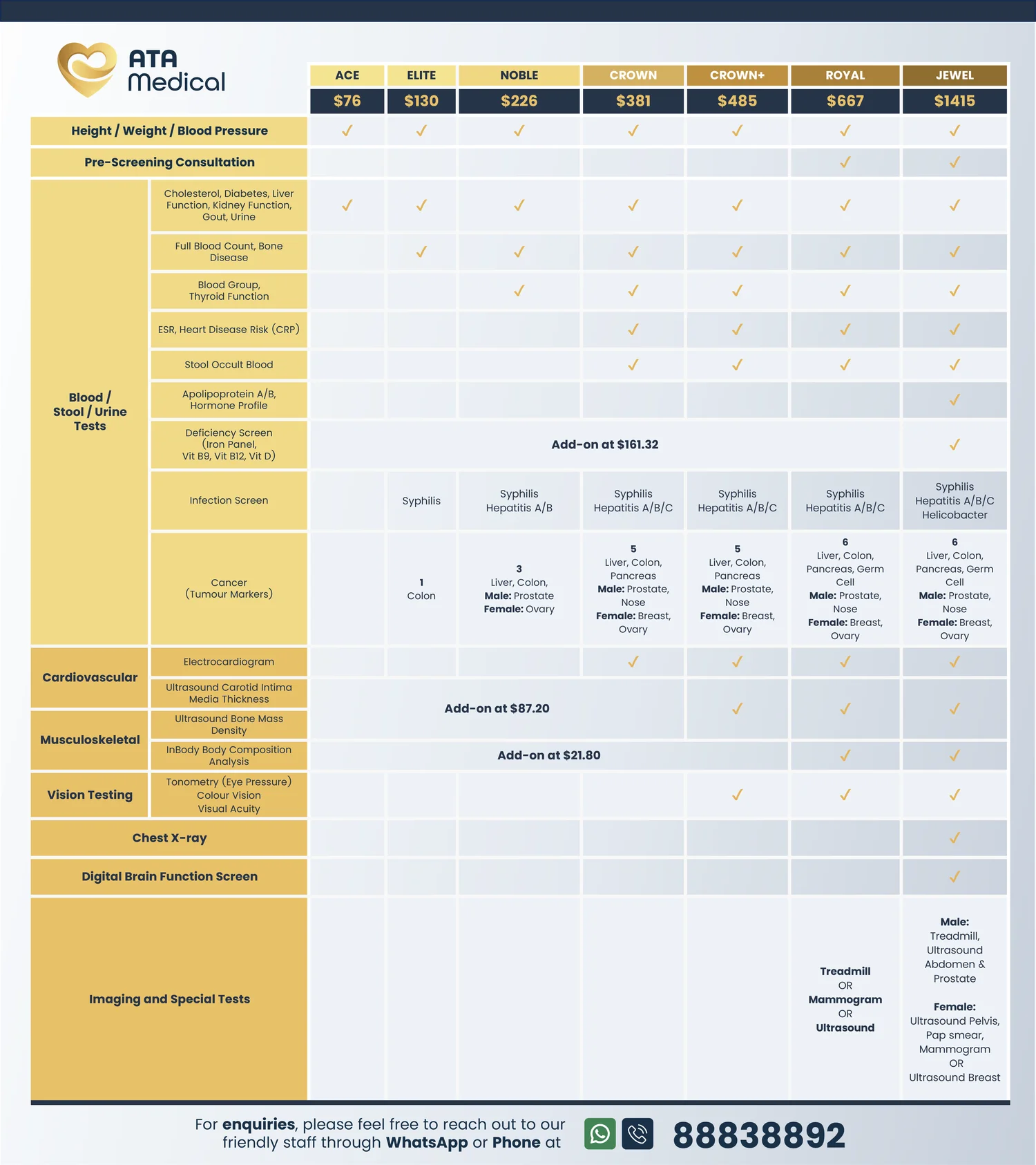
For Screen for Life recommended screenings for chronic conditions and colorectal cancer, the cost
ranges from $0 to $5, depending on your CHAS,
Pioneer Generation (PG), or Merdeka Generation (MG) card status.
Contact
us to learn more or to check your eligibility.
How Long Does a Men’s Health Screening Take?
On average, our Ace ($76) to Crown ($381) packages take approximately 30 to 60
minutes to complete. For the Royal ($667) package and above, screening can be expected
to take between 2 to 3 hours, depending on the number and type of tests included.
Feel free to enquire
with us about the best time to schedule your screening.
How to Prepare for a Men’s Health Screening?
Before attending your screening appointment, there are a few important preparations to note:
- Medication – Make a list of any medications or supplements you are taking, so you can share them with your doctor.
- Medical History – Take note of any existing medical conditions, as well as personal or family health history, including past illnesses or surgeries, to share during your consultation.
- Clothing – Wear comfortable clothing, especially if your screening includes physical examinations or imaging tests.
Our staff will provide guidance when you book your appointment. If you are unsure about any preparation requirements, please contact us to ensure a smooth screening experience.
Am I Required to Fast for My Health Screening?
With the exception of Ace ($76), Elite ($130) and Ultrasound
Liver and Ultrasound Abdomen tests, you are NOT required to fast. This is because studies
have shown that there are no significant differences in cholesterol level when fasting, and we test
for Diabetes using HbA1c.
However, if you are known to have high cholesterol or on cholesterol medications, it is advisable to
fast for at least 8-12 hours before your cholesterol test for greater accuracy.
Why Choose ATA Medical?

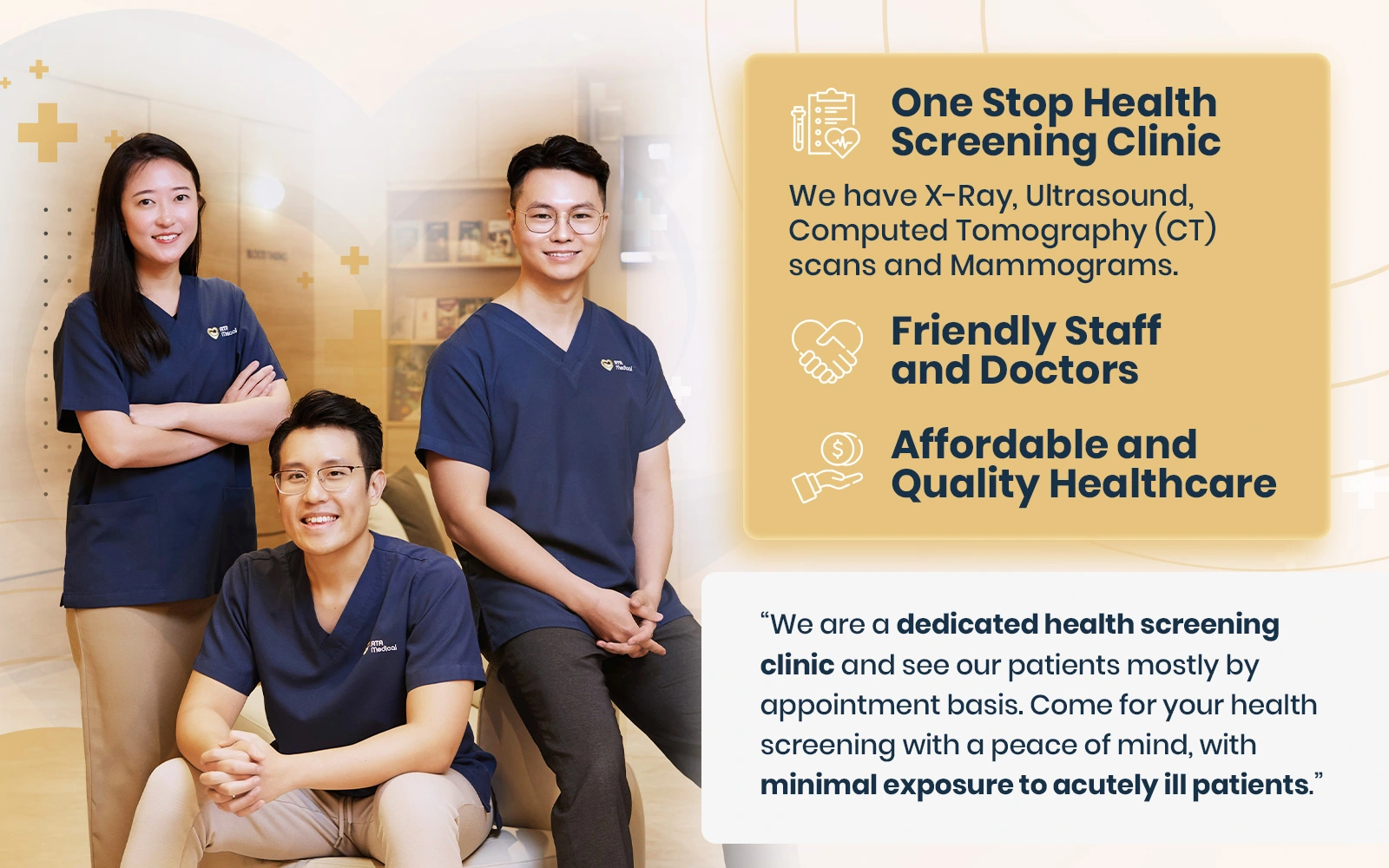


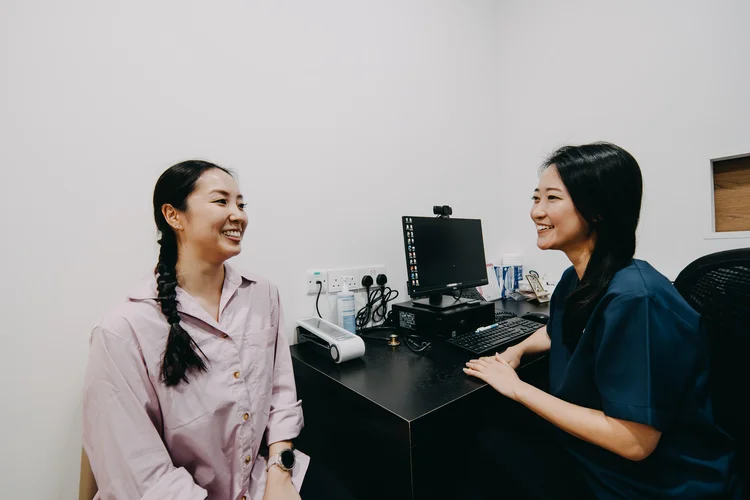



Delivering Care Patients Appreciate
Making a Difference Together
At ATA Medical, we strive to make a meaningful impact on every patient's health. With over 150,000 patients served, we are dedicated to fostering trust and enhancing well-being across our community.
Patients
Health Screening Tests
Corporate Screenings
What to Expect
FAST RESULTS
We strive to deliver your results within 7 working days.
MINIMUM WAITING TIME
Our patient-oriented processes ensure your waiting time is kept to a minimum.
Friendly Service
Service is a top priority for us at ATA Medical.
Convenient, discreet, and reliable. Book your home screening today.
Book Men's Health Screening Appointment
ATA Medical @ Orchard
Nearest MRT: Orchard Boulevard Station (TE13)
Contact Number: 6223 0682
Email: camden@atamed.sg
Opening Hours:
Mon - Fri: 8:30 AM to 12:30 PM, 1:30 PM to 5:30 PM
Sat: 8:30 AM to 12:30 PM
Sun & PH: Closed
ATA Medical @ Tanjong Pagar
Nearest MRT: Tanjong Pagar Station (EW15)
Contact Number: 6223 0682
Email: hi@atamed.sg
Opening Hours:
Mon - Fri: 8:30 AM to 12:30 PM, 1:30 PM to 5:30 PM
Sat: 8:30 AM to 12:30 PM
Sun & PH: Closed



